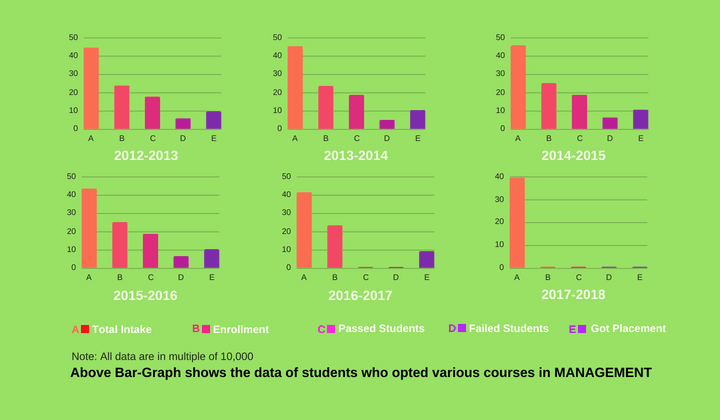Untrained teachers working at government run primary and upper primary schools are likely to lose their jobs unless they successfully complete the two-year Diploma in D. E. Ed. (D. E. Ed full form Diploma in Elementary Education). course offered by the Ministry of Human Resources Development by 2019, Prakash Javadekar, Union Minister for Human Resources Development warns.
An estimated 1.5 million to 1.8 million untrained teachers are working at schools. They teach students from Standard-1 to Standard-8. These teachers were employed by governments of various states and Union Territories administrations to comply with the Right to Education (RTE) Act.

Obtaining a D. El. Ed qualifications are compulsory for all untrained teachers after the Right of Children to Free and Compulsory Education (Amendment) Bill, 2017, was passed by the Indian Parliament.
Should you happen to be among these untrained teachers, we recommend studying for the Diploma in Elementary Education Course and saving your job. Here we provide a complete guide on how to get the D. El. Ed qualifications.
National Institute of Open Schooling has developed and administered the Diploma in Elementary Education Course.
NIOS Website
If you wish to apply for the Diploma in Elementary Education course, a goldmine of information is available from the website of NIOS (National Institute of Open Schooling). Before you proceed with the course, it is vital to register on this website and create your account.
Registration is very simple: you need to submit your name, address, details of the school where you are working and other basic information.
Pre Deled Qualification and Eligibility for
To qualify for a D. El. Ed course, here are some basic requirements.
- Higher Secondary Certificate (HSC) or it's equivalent from a recognized board of education.
- You should have scored 50 percent or higher marks in your HSC exams of its equivalent.
- El. Ed course is open to untrained teachers that are working at any primary or upper primary school run by a state government or Union Territory.
- A relaxation of five percent in HSC or equivalent exams are available to applicants from Scheduled Castes, Scheduled Tribes and Other Backward Classes.
- If you are a graduate, then the only marks they will consider are HSC or equivalent which you have obtained
- There are no lower or upper age limits to appear for the Diploma in Elementary Education Course examination.
If you meet these criteria, the next step is to apply for the D. El. Ed course entrance examination.
D. El. Ed Entrance Examination
Applying for the entrance examination for the D. El. Ed course is very simple.
- Entrance exams for Diploma in Elementary Education courses are conducted once every year.
- Examination dates are announced by education boards or State Council for Education and Training of various states and Union Territories.
- Usually, entrance exams for Diploma in Elementary Education Course are conducted in the month of July.
- In some states, you need to apply online for the D. El. Ed entrance exam. In other states with low Internet proliferation, it is possible to apply physically for D. El. Ed entrance exam by submitting a completed form, proof of identity and photographs to the exam conducting authority.
- Fees for the D. El. Ed entrance exam is Rs.100. This fee can be paid online using debit/ credit card or net banking. It can also be paid in cash.
- If you are sending the D. El. Ed entrance exam application form by post, the fee is Rs.140. It has to be paid by demand draft drawn in favour of the exam conducting authority and on a specified branch of State Bank of India.
- There are plans to introduce online payments for the D. El. Ed entrance exams through Bharat Kosh, the non-tax payments portal of the Indian government.
D. El. Ed Entrance Exam Details
Upon successful registration for the D. El. Ed course entrance exam, you will receive a hall ticket bearing your photograph.
- The hall ticket has to be endorsed by your school principal, postmaster of the nearest post office, magistrate or a senior government official.
- You will also be notified about the examination centre for the D. El. Ed entrance exams.
- In some states, you can take a Pre Entrance Exam Test (PET) to test your abilities.
- Special courses are conducted by state education boards and other authorized entities to prepare you for the D. El. Ed entrance exams.
El. Ed Entrance Exam Syllabus
Regardless of whether you hold an HSC or its equivalent or a graduate degree, the Diploma in Elementary Education Course syllabus remains the same. D. El. Ed entrance is a written exam. It is an objective-type test with multiple choice answers.
There are no negative marks or deductions for giving the wrong answer. The syllabus includes questions from subjects studied at school and higher secondary. The syllabus includes:
- Mathematics and Numerical Ability
- General Knowledge
- English
- Teaching Abilities
- Language Test (Hindi or regional language)
Diploma in Elementary Education Course entrance exams is conducted in English, Hindi and the regional language of the state. However, knowledge of the English language is compulsory.
Diploma in Elementary Education Course Details
Results of the D. El. Ed entrance exams are declared within two weeks.
Upon successful completion of the Diploma in Elementary Education entrance exam, you are eligible to study the two-year Diploma in Elementary Education course.
- Admission to the Diploma in Elementary Education Course is usually done during August.
- You can apply for the El. Ed course online or in person at any of the Institute authorized by the National Institute of Open Schooling of the Ministry of Human Resources Development.
- The total course fee for Diploma in Elementary Education is Rs.9,000.
- In some states, the fee can vary between Rs.9,000 and Rs.12,000 for the course. This is because the relaxation of Rs.1,500 in annual fees offered by National Institute of Open Schooling is optional and hence, not implemented in certain states.
- You will receive self-study material for the course. Cost of this material will be included in your course fee.
- It is possible to attend classroom studies for a Diploma in Elementary Education at specific state-run institutions.
- Look for the list of educational institutions in your area that offer classroom studies for Diploma in Elementary Education.
Syllabus for First Year D. El. Ed
Syllabus for the first year of the Diploma of Elementary Education includes a variety of subjects. As we mentioned earlier, the course material provides this knowledge. Subjects include:
1. Childhood & Children’s Development
This subject includes understanding child development and growth, needs of developing children, understanding child behaviour and meaning and characteristics of child development.
2. Contemporary Society
Topics included are understanding the nature, composition and evolution of the Indian society, knowledge about Indian traditions, religions and practices, Indian cultures and changes affecting the Indian society.
3. Understanding Self
Topics here aim at developing the abilities of teachers. They include self-development, its factors and relevance, various elements of personality development, a concept of self and self- development, life skills, their importance, development, relevance and utilization.
4. English Language Pedagogy
This is a very important subject for all teachers. Topics covered are importance of the English language in the modern world, learning written, spoken and comprehension skills in English, techniques for teaching the English language, English teaching material and methods of instruction.
Syllabus for Second Year D. El. Ed
The syllabus for second year studies for the Diploma in Elementary Education is more complex.
1. School Health
This includes physical education, the importance of hygiene and helping students develop hygienic habits, safety and self-protection against disease and hazards, elements that affect health and wellness, the importance of wellbeing and good health.
2. Socio-cultural Cognition and Change
covers topics including various elements affecting social change, culture and its impact on education, the importance of value education and results of social change in India and their reasons and assimilating different cultures in the educational ecosystem.
3. Environmental Studies
Importance of environment studies, the impact of environment on life, involving students and society in environment related issues, creating awareness about various elements related to the environment, causes of pollution, recycling and related subjects.
4. Fine Arts
Teaching arts and crafts to students, developing creativity among students, methods used in art education, the importance of fine arts, the significance of arts education, various techniques of arts and crafts, the importance of teaching arts and crafts to younger students.
5. Counselling and Guiding Students
Another important subject for second year D. El. Ed is counselling and student guidance. It covers topics including behavioral patterns, disturbances and problems faced by students, counselling and guidance techniques and their correct use according to circumstances, areas where guidance and counselling are important and learning ways to guide and counsel students.
6. Leadership Development
Topics include team building within teachers and students, importance of team building in future life and extracurricular activities, effective communication, developing leadership qualities among students, different forms and styles of leadership and using communications for developing leadership.
Please note, while these subjects are the common syllabus for all students of Diploma in Elementary Learning, their names and topics will differ in all states. Hence, you might find one subject or topic under a different title. These titles we mention are indicatory only.
Advantages of Diploma in Elementary Education Course
Other than retaining your position as a teacher at a government run school, doing a Diploma in Elementary Education also opens several opportunities. Upon successful completion, you can seek jobs at private schools for higher pay.
Additionally, you are eligible to open coaching classes for primary and upper primary students or work as a private tutor.
Under the Indian government’s Skills India initiative, women and men that hold Diploma in Elementary Education Course can also operate coaching classing to educate other incumbents.
They are eligible for loans under Micro Units Development and Refinance Agency (MUDRA) Bank schemes from various public sector, private and cooperative lenders.
Flipside of Diploma in Elementary Education Course
There are some flipsides to the Diploma in Elementary Education Course. The first being, it is not open to any fresher that have completed HSC or equivalent.
Secondly, the Indian government is yet to explain how it plans to train between 1.5 million to 1.8 million untrained teachers before the 2019 deadline expires.
Thirdly, any teacher that wishes to study the D. El. Ed course has to be endorsed by the school where they work.
Without such endorsement, a teacher cannot enroll in the course. At the same time, NIOS will confer the D. El. Ed degree, it is unclear whether qualifications from one state would be valid for working as a trained teacher in another part of India.
In Conclusion
Diploma in Elementary Education is a course essential for every untrained teacher in India that wishes to retain their jobs after the 2019 deadline given by the Indian government lapses.
Upon successful completion of this course, you are qualified as an educator. To encourage untrained teachers across India, Diploma in Elementary Education courses are available in the official languages of almost every Indian state.
NIOS states the program aims at enabling target groups and helping the development of their teaching skills.
Further, the course also strives to develop core competencies, attitudes and understanding of teacher-student relationships, to make teaching enjoyable and practical.





